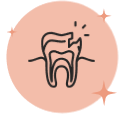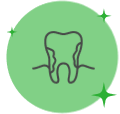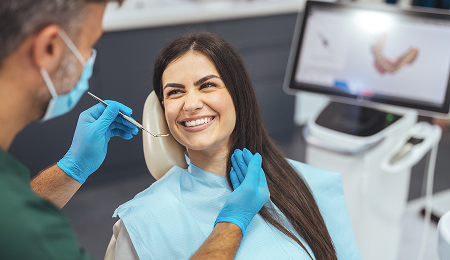Un sorprendente 84 % de las mujeres mayores de 50 años no saben cómo la menopausia afecta su salud bucal. Es hora de que comencemos a hablar de ello, y Delta Dental está liderando la conversación. Comprender la relación entre la menopausia y la salud bucal permite a las mujeres cuidar mejor de su salud oral y general.
-
-
Romper el silencio y las barreras, todo al mismo tiempo
La menopausia no se trata solo de cambios de humor y sofocos. La boca seca, las encías retraídas, las caries, una sensación de hormigueo en la boca pueden ser signos de que te estás acercando o que ya estás experimentando la menopausia.
Delta Dental ayuda a destacar la conexión entre la salud bucal y la menopausia en el documental “The (M) Factor: Shredding the Silence on Menopause”, que se estrenó en PBS en octubre de 2024. No te pierdas esta edición especial de la película, donde se aborda el impacto de la menopausia en la salud oral de las mujeres.
-
La menopausia y la boca:
conectar los puntosDelta Dental se dedica a ampliar el acceso a la atención bucal de calidad y a apoyar la salud general. Una prioridad clave para nosotros es mejorar la educación e impulsar cambios duraderos en las políticas para abordar problemas sistémicos del cuidado de la salud.
¿Por qué la menopausia? Para citar a Sarah Chavarria, Directora Ejecutiva de Delta Dental, “En Delta Dental, creemos que el impacto de la menopausia en la salud bucal debería ser una parte integral del diálogo más amplio, para ayudar a las mujeres a mantener su bienestar y salud holística durante este acontecimiento importante de la vida”. -
Nuestra Encuesta de menopausia de 2023 ayudó a visibilizar el impacto oculto de la menopausia al romper el estigma en torno al tema.
Nuestra Encuesta de menopausia de 2024 dio voz a los síntomas, a menudo silenciosos, que las mujeres experimentan durante la menopausia. El objetivo es iniciar conversaciones sobre el tema y ayudar a las mujeres a hacerse cargo de su salud bucal y general durante esta fase crucial.
¿Cómo afecta la menopausia a los dientes y las encías?
Nuestros dientes y encías inevitablemente cambian a medida que envejecemos, pero las mujeres en particular experimentan un envejecimiento diferente como resultado de los cambios hormonales que ocurren durante esta etapa. A medida que los niveles de estrógeno disminuyen, algunas características comienzan a cambiar en la boca.
-

Boca reseca
Una de cada tres mujeres mayores de 50 años confirma tener boca seca. La reducción de los niveles de estrógeno puede provocar una disminución en la producción de saliva, lo que aumenta el riesgo de caries, enfermedad de las encías e infecciones bucales.
-

Enfermedad de las encías
El 87% de las mujeres no conocía la relación entre la menopausia y la enfermedad de las encías. Sin embargo, los controles dentales regulares y el abordaje temprano de los síntomas pueden ayudar a prevenir la progresión.
-

Reducción de la densidad de la mandíbula
La disminución de estrógenos puede debilitar los huesos, incluyendo la mandíbula. Muchas mujeres, un enorme 87%, desconocen este cambio, lo que puede provocar la pérdida de dientes y otras complicaciones. Los chequeos dentales regulares y una dieta rica en calcio pueden ayudar.
-

Pérdida de dientes
Los efectos combinados de la enfermedad de las encías y la reducción de la densidad del maxilar pueden aumentar el riesgo de pérdida de dientes.
-

Caries
Los cambios hormonales menopáusicos pueden hacer que los dientes sean más susceptibles a las caries debido a la reducción de la saliva y el aumento del riesgo de enfermedad de las encías. Dado que la saliva ayuda a proteger los dientes y las encías, la probabilidad de caries puede aumentar.
-

Encías retraídas
También hay un vínculo entre la menopausia y las encías. Una de cada tres mujeres mayores de 50 años informa que notó que sus encías estaban retraídas, lo que expone más el diente y sus raíces. Estas brechas o “huecos” acumulan bacterias, lo que puede provocar a una mayor sensibilidad.
Fuente: Encuesta de menopausia de 2023
Falta de información acerca de la menopausia y la salud dental
Brindar a las mujeres información adecuada sobre la menopausia, la salud bucal y su cuidado es fundamental para fomentar un envejecimiento saludable. Sin embargo, encontrar información sobre este tema no siempre es fácil.
El desafío de encontrar buena información
Muchas mujeres mayores de 50 años enfrentan dificultades para acceder a información confiable acerca de la menopausia y su impacto en la salud bucal. Con tan poco disponible, muchas mujeres recurren a Internet con la misma frecuencia que recurren a sus proveedores de cuidado de la salud para obtener las respuestas que necesitan, lo que revela una carencia real en la información que proporcionan los profesionales.

El 27 % se esfuerza por encontrar recursos acerca de la menopausia y la salud bucal.

El 84 % cree que debería haber más información disponible.

El 54 % planeó dedicar más tiempo a su rutina de cuidado bucal después de conocer más acerca de la conexión.
Fuente: Encuesta de menopausia de 2023
La importancia de hablar con tu dentista
Las conversaciones abiertas acerca de la menopausia y su conexión con el cuidado bucal pueden empoderar a las mujeres para que manejen mejor su salud. Pueden ser más proactivas en su atención, tomar decisiones informadas acerca de sus rutinas de higiene bucal y buscar ayuda profesional cuando sea necesario. Hablar abiertamente acerca de la menopausia puede ayudar a las mujeres a entender el impacto en su bienestar general, lo que conduce a hábitos más saludables y a una prevención más eficaz de los problemas de salud bucal.

Las mujeres mayores de 40 años consideran útil recibir asesoramiento sobre salud bucal relacionado con la menopausia durante las consultas dentales.

El 93 % de las mujeres dijo que sería útil recibir instrucciones específicas sobre qué hacer con respecto a su salud bucal durante la menopausia.

Las mujeres mayores de 40 años tienen más probabilidades de priorizar el cuidado de las encías durante la menopausia después de conocer acerca de la conexión.
Fuente: Encuesta de menopausia de 2024
Additional resources to protect your mouth throughout menopause
En Delta Dental, nos comprometemos a ayudar a las mujeres en el siguiente capítulo de su vida. Consulta estos recursos y obtén las herramientas que necesitas para atravesar la menopausia con confianza.

¿Cómo hablar con tu dentista acerca de la menopausia? (con plantilla para correo electrónico)
Este recurso proporciona consejos prácticos sobre cómo tener una conversación abierta con tu dentista acerca de la menopausia y la salud bucal. Incluye una plantilla para correo electrónico, para ayudarte a comenzar.

Perimenopausia y salud bucal
La etapa de transición de la perimenopausia puede afectar tu salud bucal. Comprende qué esperar a medida que te acercas a la menopausia y cómo mantener tu salud dental.

Posmenopausia y salud bucal
Tus necesidades de salud bucal pueden continuar evolucionando después de la menopausia. Este recurso analiza los efectos continuos de la reducción de los niveles de estrógeno en los dientes y las encías, y ofrece consejos para mantener una buena higiene bucal a medida que envejeces.
